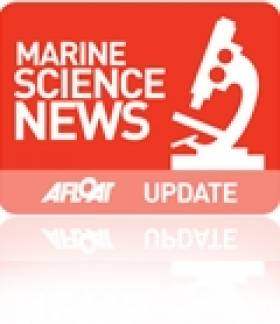Displaying items by tag: Visits Marine Institute
Prince of Wales Visits the Marine Institute Galway
#RoyalVisitsMarine - Today the Prince of Wales visited the Marine Institute in Oranmore, Co. Galway where he met Taoiseach Enda Kenny, and Minister Simon Coveney, and talked to Marine Institute staff about their work in areas including analysing the impact of climate change on the ocean, sustainable fisheries, marine bio-discovery and international collaboration on ocean research.
During the visit, His Royal Highness heard about the first trans-Atlantic mapping survey to take place under the Atlantic Ocean Research Alliance between the EU, Canada and USA. The Irish-led survey will begin on 1st June when the RV Celtic Explorer sails from St John's Newfoundland to Galway.
Prince Charles welcomed the Galway Statement, which established the Atlantic Ocean Research Alliance, as an important step in improving international co-operation in understanding the impact of climate change on the oceans.
Simon Coveney, Minster for Agriculture Food, the Marine & Defence said "The Marine Institute is at the cutting edge of international marine research, driving forward our understanding of the Atlantic Ocean. The work of the Institute drives ocean discovery and exploration. It also provides the basis for the sustainable development of our marine resources. I was delighted to be able to showcase the work taking place in Galway to Prince Charles, who has long had an interest in our understanding and governance of the Oceans."
How we observe and analyse the impacts of climate change on the oceans was of particular interest to His Royal Highness ahead of the United Nations Conference on Climate Change in Paris later this year. His Royal Highness was also very interested in the ecosystem approach to fisheries management and was joined by staff from His Royal Highness's International Sustainability Unit, a charity set up to facilitate consensus on how to resolve some of the key environmental challenges facing the world – such as food security, ecosystem resilience and the depletion of natural capital.
Dr. Peter Heffernan, CEO of the Marine Institute, highlighted the interdependence between global ocean health and human health:
"The oceans are the life support system of our planet, producing half of all the oxygen we breathe, so it's essential that we map our seabed globally and improve our ocean observation and forecasting systems to better understand the impacts of climate change on our oceans."
His Royal Highness saw first-hand some of the technology used to explore and observe the ocean including an unmanned submarine, the ROV Holland I, with Galway Bay as a backdrop, where a subsea cable was laid last month connecting the Galway Bay Ocean Observatory to the shore.
Dr Heffernan said, "This technology will give us eyes and ears in the ocean for continuous monitoring of temperature and effects in the ocean. By 2020, in partnership with the Atlantic Ocean Research Alliance, we aim to be able to predict the major risks and changes in the dynamics of the Atlantic Ocean, through a fully integrated Atlantic Ocean Observation System providing real time data-streams online by 2020."
The Prince also spoke to Dr Andrew Wheeler, from University College Cork, about leading the discovery of the Moytirra Vents, a previously uncharted field of hydrothermal vents on the mid-Atlantic ridge. The survey took place on the RV Celtic Explorer in 2011 using the ROV Holland I to explore the deep sea with a team of Irish and British scientists from University College Cork, the National Oceanography Centre and the University of Southampton in the UK.





























































